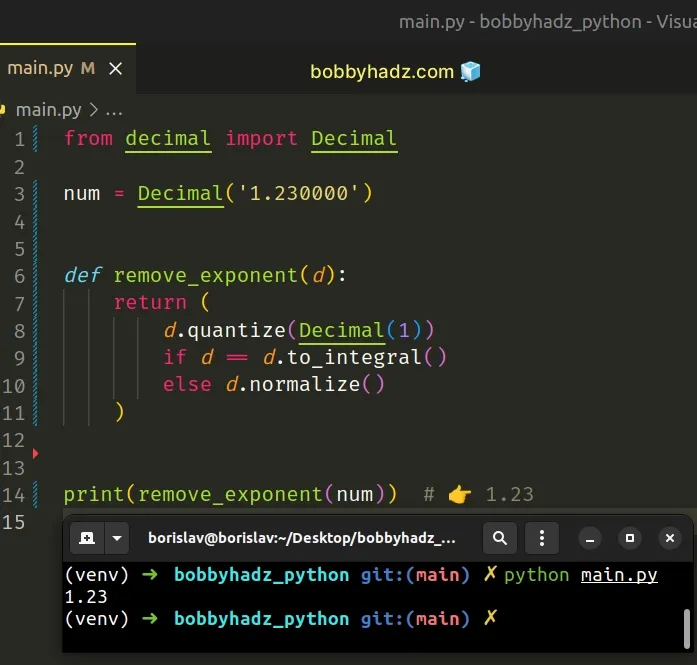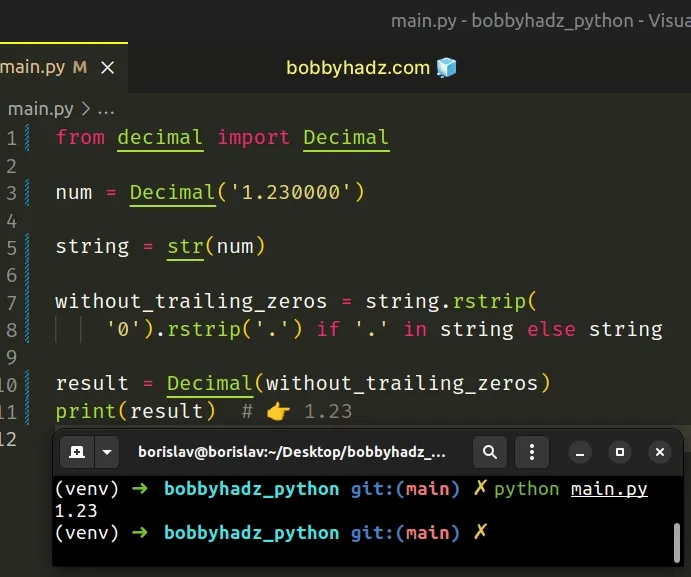How to Remove the trailing Zeros from a Decimal in Python
Last updated: Apr 9, 2024
Reading time·2 min

# Remove the trailing zeros from a Decimal in Python
To remove trailing zeros from a decimal:
- Use the
decimal.to_integral()method to check if the number has a fractional part. - If it does, round the number and return it.
- If it does not, use the
decimal.normalize()method to strip any trailing zeros.
from decimal import Decimal num = Decimal('1.230000') def remove_exponent(d): return ( d.quantize(Decimal(1)) if d == d.to_integral() else d.normalize() ) print(remove_exponent(num)) # 👉️ 1.23

The first function is taken from the Decimal FAQ section of the official docs.
The to_integral() method rounds to the nearest integer.
from decimal import Decimal # 👇️ True print(Decimal('1.0000') == Decimal('1.0000').to_integral()) # 👇️ False print(Decimal('1.9000') == Decimal('1.9000').to_integral()) print(Decimal('1.0000').to_integral()) # 👉️ 1
If the number has no decimal part, we use the quantize() method to round to a
fixed number of decimal places.
If the number has a decimal part, we use the Decimal.normalize() method to strip the rightmost trailing zeros.
from decimal import Decimal print(Decimal('1.230000').normalize()) # 👉️ 1.23 print(Decimal('3.456000000').normalize()) # 👉️ 3.456
We only use the normalize() method if the number has a decimal part because it
could remove zeros to the left of the decimal.
from decimal import Decimal print(Decimal('500.000').normalize()) # 👉️ 5E+2 print(Decimal('510.100').normalize()) # 👉️ 510.1
Alternatively, you can use the str.rstrip() method.
# Remove trailing zeros from decimal using str.rstrip()
This is a two-step process:
- Use the
str()class to convert the decimal to a string. - Use the
str.rstrip()method to strip the trailing zeros if the number has a decimal point.
from decimal import Decimal num = Decimal('1.230000') string = str(num) without_trailing_zeros = string.rstrip( '0').rstrip('.') if '.' in string else string result = Decimal(without_trailing_zeros) print(result) # 👉️ 1.23

The first step is to convert the decimal to a string.
The str.rstrip() method returns a copy of the string with the provided trailing characters removed.
. if the decimal part only consisted of trailing zeros.The example also checks whether the string contains a dot, so we don't attempt
to strip trailing zeros from numbers that don't have a decimal part, e.g. 5000
to 5.
# Additional Resources
You can learn more about the related topics by checking out the following tutorials:

